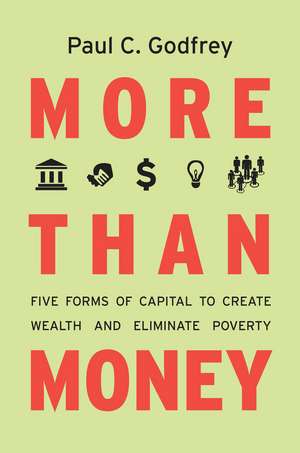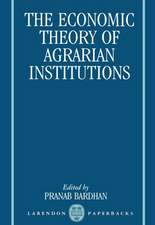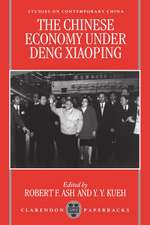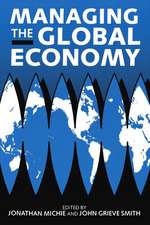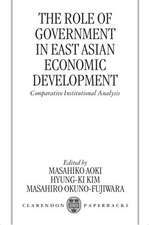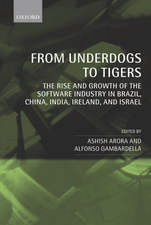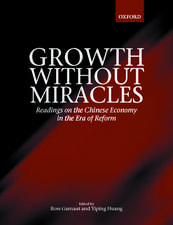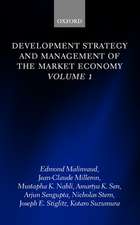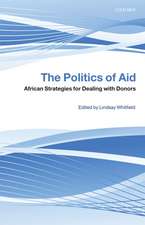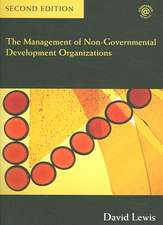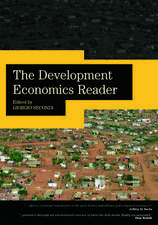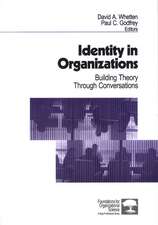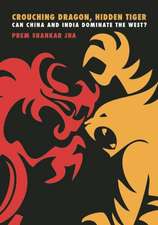More than Money: Five Forms of Capital to Create Wealth and Eliminate Poverty
Autor Paul Godfreyen Limba Engleză Paperback – 10 dec 2013
Is poverty inevitable? No, says author Paul Godfrey. More than Money shows how organizations can win the fight against poverty and create prosperity for people at the base of the pyramid in the developing and developed world.
This book presents a novel framework that shows how five types of interrelated capital—institutional, human, social, organizational, and physical—enable development and sustainable growth. In addition to a widely-applicable model, Godfrey provides principles to guide application. Core chapters articulate each specific form of capital and provide examples of how it contributes to the triple bottom line. Not just a theoretical examination of poverty, More than Money delivers timely advice to organizations that produce goods and services, implement policies, and create meaningful change on the ground. This book will guide social innovators and entrepreneurs in business, government, and civil society settings as they create a vision, assemble a team of strong partners, and effectively measure social innovation.
This book presents a novel framework that shows how five types of interrelated capital—institutional, human, social, organizational, and physical—enable development and sustainable growth. In addition to a widely-applicable model, Godfrey provides principles to guide application. Core chapters articulate each specific form of capital and provide examples of how it contributes to the triple bottom line. Not just a theoretical examination of poverty, More than Money delivers timely advice to organizations that produce goods and services, implement policies, and create meaningful change on the ground. This book will guide social innovators and entrepreneurs in business, government, and civil society settings as they create a vision, assemble a team of strong partners, and effectively measure social innovation.
| Toate formatele și edițiile | Preț | Express |
|---|---|---|
| Paperback (1) | 256.79 lei 3-5 săpt. | |
| Stanford University Press – 10 dec 2013 | 256.79 lei 3-5 săpt. | |
| Hardback (1) | 882.49 lei 6-8 săpt. | |
| Stanford University Press – 10 dec 2013 | 882.49 lei 6-8 săpt. |
Preț: 256.79 lei
Nou
Puncte Express: 385
Preț estimativ în valută:
49.14€ • 51.44$ • 40.66£
49.14€ • 51.44$ • 40.66£
Carte disponibilă
Livrare economică 15-29 martie
Preluare comenzi: 021 569.72.76
Specificații
ISBN-13: 9780804782807
ISBN-10: 0804782806
Pagini: 240
Dimensiuni: 152 x 229 x 18 mm
Greutate: 0.32 kg
Editura: Stanford University Press
Colecția Stanford Business Books
ISBN-10: 0804782806
Pagini: 240
Dimensiuni: 152 x 229 x 18 mm
Greutate: 0.32 kg
Editura: Stanford University Press
Colecția Stanford Business Books
Recenzii
"More than Money provides the readers with one of the most complete lists of the ideas, incentives, and leadership skills needed to enhance personal and social flourishing. Putting them into practice will help eliminate poverty one person at a time."—Alejandro Chafuen, FORBES
"Although others have added social capital to the discussion of poverty, Paul Godfrey's innovative five-fold treatment goes well beyond existing theories to provide a remarkably well-grounded framework for future work. This is a highly effective analytical tool for addressing problems of poverty and development. More than Money expands the realm of the discussion beyond mere symptoms by effectively focusing on the dynamic root causes of poverty."—Wade Channell, Senior Legal Reform Advisor, U.S. Agency for International Development
"We can't change the world if we don't first understand it. Godfrey strikes a keen balance between acknowledging the complexity of poverty while pointing to thoughtful solutions. This book is essential reading for those who want their results to be as good as their intentions."—Joseph Grenny, co-author of Influencer and Crucial Conversations
"A fascinating exploration into the definition of self-reliance and capital as they relate to and influence poverty. Godfrey's argument on the multi-faceted nature of poverty provides thought-provoking considerations for philanthropists and social innovators who seek systemic poverty elimination."—Jessamyn Lau, Program Leader, Peery Foundation
Notă biografică
Paul C. Godfrey is Professor of Strategy and Associate Academic Director of the Melvin J. Ballard Center for Economic Self-Reliance at Brigham Young University's Marriott School of Management, where he helps students and practitioners translate organization and economic theory into action that reduces poverty. He has recently pursued projects in Ghana, the Navajo Nation, and with disadvantaged populations in the United States.
Descriere
More than Money provides innovators and entrepreneurs with strategies for eradicating poverty in developed and developing countries. Author Paul Godfrey shows how five types of interrelated capital—institutional, human, social, organizational, and physical—can be harnessed to create not just economic value, but also social wellbeing.
